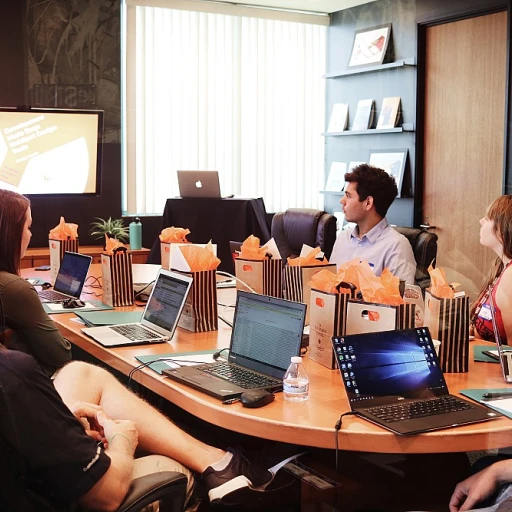
Understanding the Landscape of Educational Projects in India
Navigating the Educational Project Landscape in India
In recent years, the landscape of educational projects within Indian companies has evolved significantly. The education sector in India is burgeoning with opportunities for project managers to tackle projects ranging from curriculum development to the implementation of new learning tools. However, understanding the various facets of educational project management is essential for office managers who aim to streamline tasks efficiently.
Office managers in the education sector often deal with diverse projects that require meticulous planning and execution. Whether integrating technology into classrooms or coordinating training sessions for teachers, the projects can vary greatly in scope and complexity. Project managers thus need to possess a blend of management skills and an understanding of the education domain to effectively deliver results.
Several challenges complicate the successful execution of educational projects. Managers must ensure that resources, time, and development are meticulously planned to help students and teachers achieve the desired outcomes. Innovative educational projects require resources that include both financial capital and human skills. Managing these resources efficiently can make a substantial difference in outcomes.
As educational institutions continue to embrace digital platforms, the application of management software and tools has become a cornerstone of success. Office managers are encouraged to leverage these tools to stay on top of deadlines and manage team members effectively to ensure projects are completed in real time. For more insights on optimizing educational project management, understanding effective remote work policies can provide valuable guidance.
Key Challenges Faced by Office Managers
Obstacles That Office Managers Need to Navigate
The realm of educational projects in India presents a complex network of challenges for office managers. Managing these projects demands a multifaceted approach due to the unique nature of the education sector. Office managers significantly influence how educational institutions handle project management, directly impacting the learning experiences of students and teachers.
A critical challenge is efficiently managing time and resources. Educational projects often operate within fixed schedules aligned with academic calendars. Balancing time constraints with resources, such as teaching materials and educational tools, requires strategic planning and foresight.
Another common obstacle is the coordination of team members. Project teams consisting of teachers, education experts, and administrative staff need to work in synergy to ensure the seamless execution of educational tasks. This necessitates cultivating management skills that focus on improving communication and collaboration.
Furthermore, adapting to evolving project management software in educational settings poses its challenges. Office managers must stay updated on the latest management tools to track tasks and project timelines effectively in real time.
Finally, the diverse needs of students and the varied educational objectives set by institutions add complexity to project planning and execution. Projects may range from developing curricula to integrating new educational technologies, each requiring a tailored approach based on the specific educational context.
Strategies for Effective Project Planning
Implementing Strategies for Success in Educational Projects
Effective project planning is crucial in the education sector, especially when managing educational projects where the stakes are high for both students and teachers. Developing robust project management skills can significantly aid in navigating the intricacies of education project planning. One essential step in this process is recognizing the importance of a comprehensive project plan that outlines all tasks and resources required. This enables educational institutions to allocate their resources wisely and ensure that project milestones are met on time. Additionally, understanding real-time data analysis can greatly benefit project managers by allowing them to track progress and make adjustments as necessary. Utilizing management tools can streamline project workflows, making it easier to manage extensive projects. Project management software enables the planning and monitoring of projects to ensure they stay on track. These tools can help students and teachers by automating routine tasks, thus freeing up time for more critical developmental work. A user agreement is often necessary when integrating software solutions to protect privacy and define the terms of use clearly. Furthermore, fostering a collaborative environment is key. Building a cohesive project team comprised of capable and motivated team members will help achieve educational project objectives. Regular communication and feedback loops are vital, as they allow for continuous learning and development throughout the project's lifecycle. With the right strategies and tools in place, the path to successful educational project management becomes more navigable. Office managers equipped with effective planning methods can ensure projects not only reach their goals but also contribute to ongoing improvement and success in the education sector. For more insights on integrating external collaborators, read about how this can be effectively achieved through efficient integration practices.Leveraging Technology for Project Success
Utilizing Cutting-edge Tools for Enhanced Efficiency
In the realm of educational project management, leveraging technology has become a cornerstone for achieving project success. The integration of advanced management tools can significantly streamline the process, enhancing efficiency and productivity.
For office managers in charge of educational projects, adopting the right management software is crucial. These tools not only help in planning and executing tasks but also enable the project manager to track progress in real time. This real-time monitoring allows for quick adjustments to be made, ensuring the project remains on track.
For instance, tools designed for task management can assist in organizing the myriad tasks associated with educational development projects. This ensures that both students and teachers have a clear understanding of their roles and responsibilities. Such clarity fosters better collaboration and communication among team members.
Moreover, by integrating learning management systems, educational institutions can facilitate continuous development for teachers, equipping them with the necessary skills to better manage their time and resources. This ongoing development helps in aligning the educational goals of the institution with the project's objectives, thereby creating a conducive learning environment for students.
The utilization of technology in project management also enhances decision-making capabilities. Equipped with detailed insights and analytics, project managers can make informed decisions that drive project success. This data-driven approach aligns with the larger goals of management education, enabling a seamless implementation of educational projects.
Ultimately, the strategic implementation of technology in educational project management not only improves efficiency but also ensures the overall success of the project, benefiting all stakeholders involved, including students, teachers, and project teams.
Building a Collaborative Team Environment
Crafting a Unified Vision with Your Team
Building a collaborative team environment is critical for the fruitful execution of educational projects. In the context of Indian companies, where tasks often span multiple disciplines and involve diverse experts, it is crucial that project managers align team members towards a shared vision. Project managers play a vital role in defining this vision and ensuring every team member is on the same page. Regular meetings can be organized to discuss project objectives and timelines. This helps to clarify every task and allows for adjustments as needed. Educational project teams in India can particularly benefit from clearly defined roles and shared responsibilities, ensuring that each member's skills are utilized efficiently.Fostering Open Communication
Open communication is key to breaking down barriers and encouraging collaboration among project teams. Encouraging transparent communication will help ease challenges related to project planning, execution, and monitoring. In a sector as fluid as educational project management, adapting to real-time changes and feedback is essential. Team members should feel comfortable discussing project developments, addressing concerns, and suggesting improvements. Tools like project management software can facilitate better communication. These tools offer real-time updates and centralized information sharing systems, empowering teams to perform optimally while ensuring that students and teachers receive the best possible learning experience.Implementation of Effective Management Practices
Integrating effective management practices within the project team’s workflow can enhance productivity and innovation. Leveraging management skills and competencies will help streamline processes and make more efficient use of resources. By adopting a flexible approach and being open to continuous learning, team members can contribute effectively, leading to timely project completion. It is also beneficial to invest in training programs that enhance both managerial and technical skills. Providing opportunities for skill development not only aids in professional growth but also fosters a supportive environment where creativity and strategic thinking are prioritized.Celebrating Achievements Together
Recognition of achievements boosts team morale and motivation. Celebrating milestones, both big and small, can help solidify the bond among team members, fostering a positive team spirit. Whether it’s a launch of a new educational tool or successful fulfillment of a planned task, acknowledging these efforts will encourage further collaboration and commitment to reaching project objectives. Ultimately, a harmonious team that works towards the common goal will help educational projects flourish, offering enhanced learning opportunities for students and fostering innovation within the educational sector.Measuring Success and Continuous Improvement
Monitoring Progress and Adapting for Continuous Improvement
In the realm of educational project management, measuring success involves more than just hitting deadlines or staying within budget. It's about the impact on students, teachers, and the broader educational outcomes. As office managers, it's crucial to implement clear performance metrics that reflect the objectives laid out during the project planning phase. Project management in the education sector necessitates precision and adaptability. Here’s how:- Feedback Loops: Regular feedback from project team members, including students and educators, provides insights into the real-time effectiveness of management tools and strategies. This feedback loop is vital for ongoing learning and development.
- Data-Driven Decisions: Utilize management software to track tasks and progress, ensuring all efforts align with the planned objectives. This approach helps identify areas needing improvement, allowing for timely interventions.
- Skill Development: As tasks are completed, assess whether project outcomes have contributed to the intended skill enhancement for both students and faculty. This evaluation ensures that educational projects are not just concluded but evolve with meaningful learning experiences.













